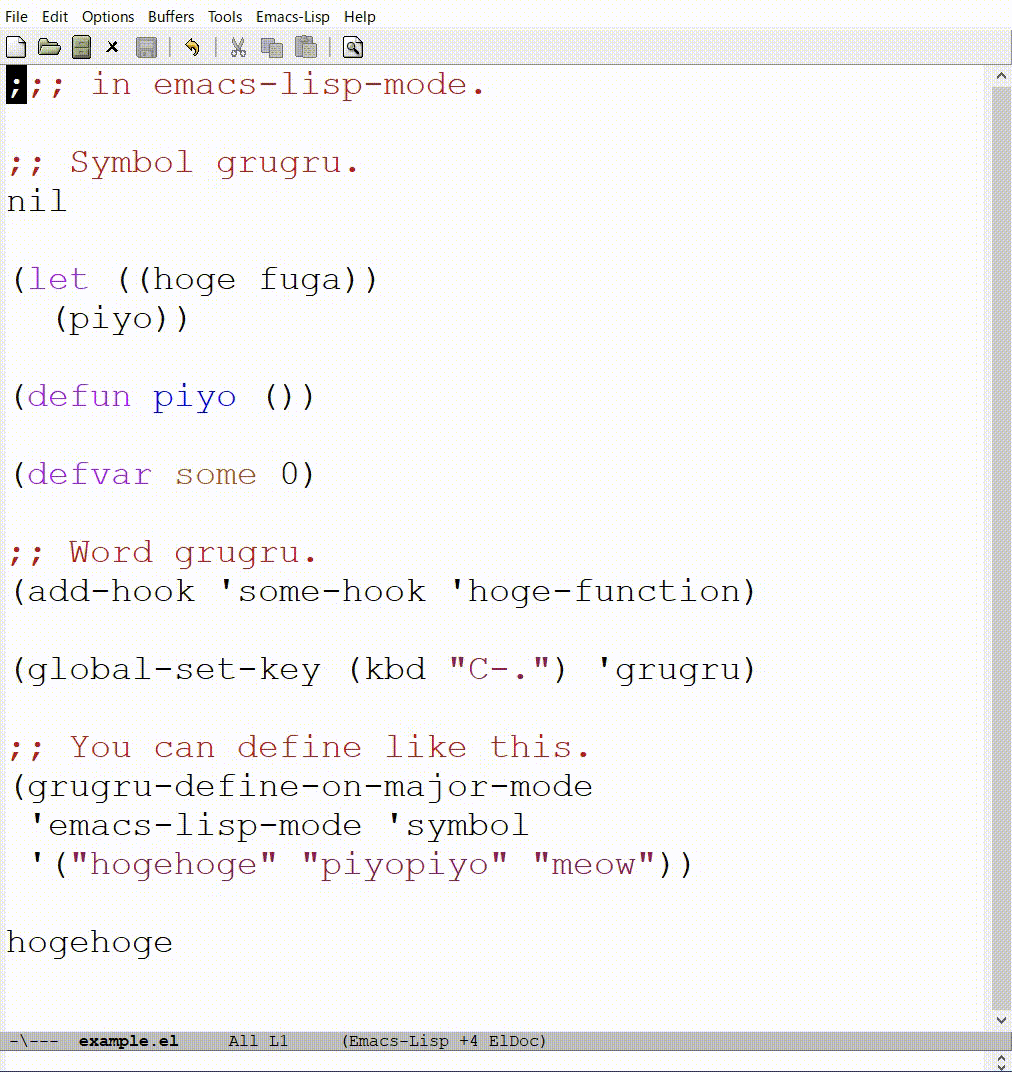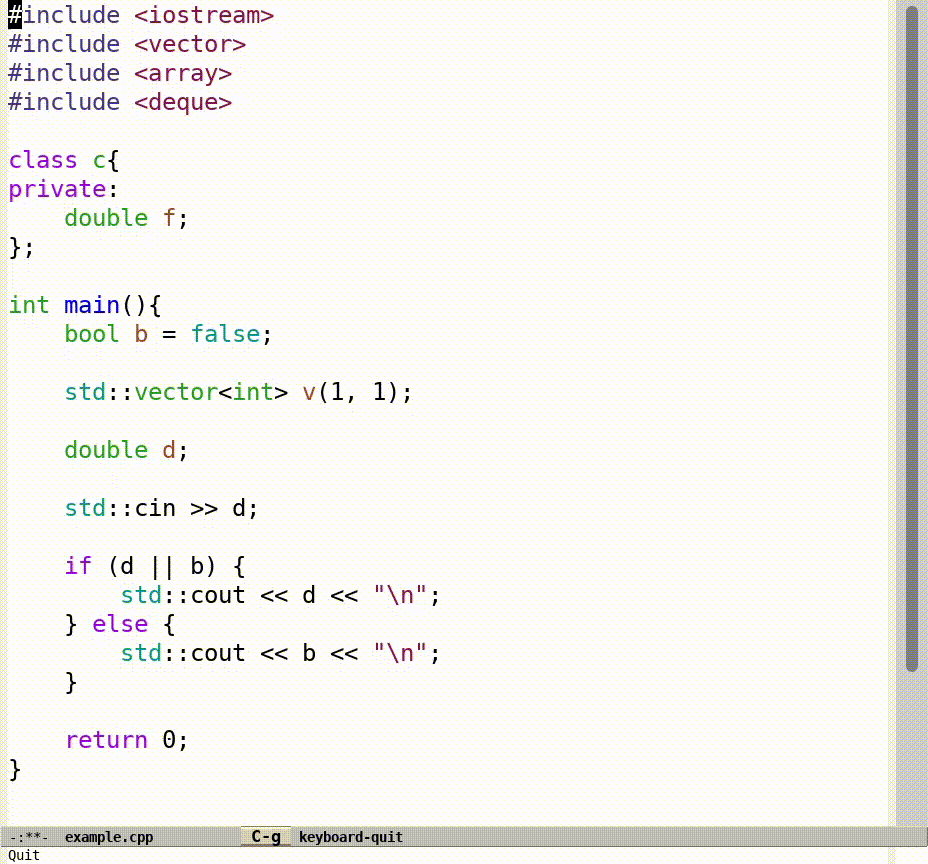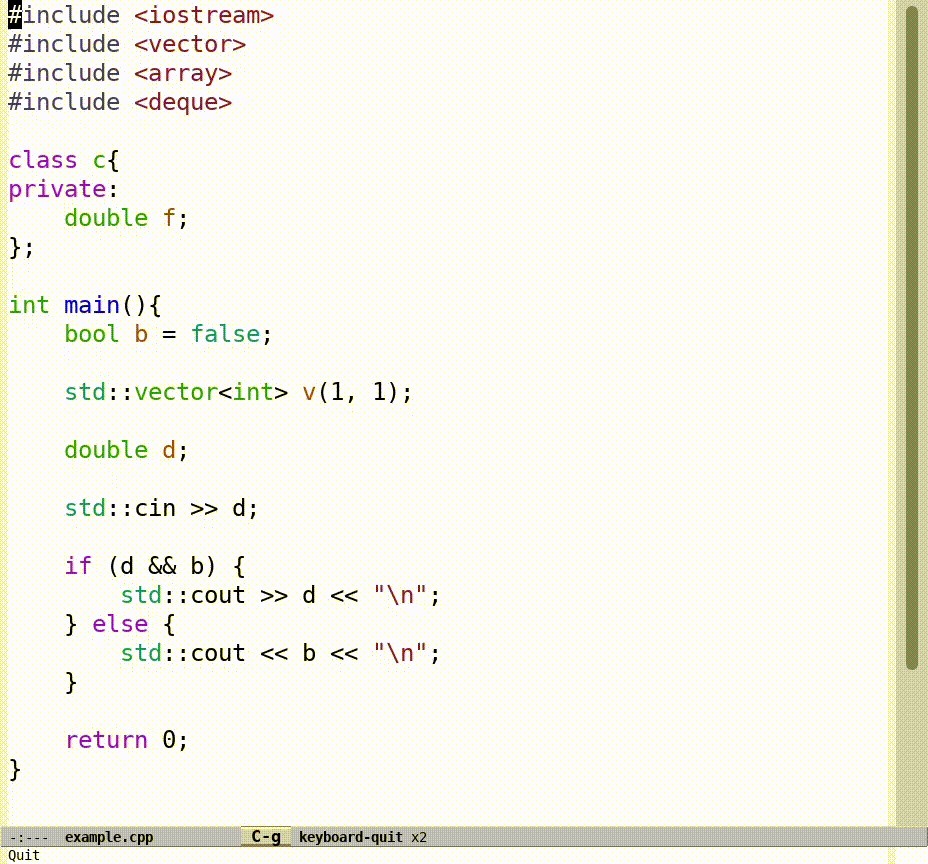With this package, you can rotate things at point.
You can interactively use the function grugru. This function rotate the thing at point
if assigned. You can assign rotated things with
grugru-define-on-major-mode, grugru-define-on-local-major-mode, and grugru-define-local.
If you use grugru, you should assign grugru to 1 stroke key like C-;, or M-g.
(global-set-key (kbd "C-;") #'grugru) ; Or other key.If you want use default grugru, eval grugru-default-setup. In the other words,
add to your init.el:
(grugru-default-setup)If you want grugru to highlight gurgruable thing, add to your init.el:
(grugru-highlight-mode)If you want to change default action at point, you can use grugru-edit,
with which you can edit grugrus at point interactively. The change edited by this
function is saved in grugru-edit-save-file,
and loaded by run grugru-edit-load. So to load the change, you can write
on init.el after (grugru-default-setup):
(grugru-edit-load)If you want to use ivy or ido as completing-read, set grugru-edit-completing-function.
Or, you can use grugru-redefine-\* or grugru-remove-\*
for non-interactive editing of default setup.
;; Define grugru on major-mode.
(grugru-define-on-major-mode 'c-mode 'symbol '("unsigned" "signed"))
(grugru-define-on-major-mode 'c-mode 'word '("get" "set"))
;; Now, you can toggle unsigned <=> signed and get <=> set
;; by running the command grugru in c-mode.
;; You can pass a list of symbol major-mode instead of one.
(grugru-define-on-major-mode '(java-mode c++-mode) 'word '("get" "set"))
;; Define grugru on current major-mode.
;; Same as (grugru-define-on-major-mode major-mode 'symbol '("red" "green" "yellow"))
;; This should be run in some hook or function,
;; because major-mode is not confirmed if in init.el.
(add-hook 'c-mode-common-hook
(lambda ()
(grugru-define-on-local-major-mode 'symbol '("red" "green" "yellow"))))
;; Define grugru on local. Should be defined in some hook or function,
;; because it is saved buffer local.
(add-hook 'text-mode-hook
(lambda ()
(grugru-define-local 'word '("is" "was"))
(grugru-define-local 'word '("I" "my" "me" "mine"))))
;; Define grugru globally. This is applied in all buffers.
(grugru-define-global 'symbol '("yes" "no"))
;; Define grugru keeping case:
(grugru-define-global 'symbol (grugru-metagenerator-keep-case '("yes" "no")))
;; If you want grugru to define grugru defaultly keeping case:
(customize-set-variable 'grugru-strings-metagenerator #'grugru-metagenerator-simple)
;; You can use function instead of list of strings.
(grugru-define-on-major-mode
'c-mode 'symbol
;; Optional argument `rev' is flag for backward rotation.
;; If the second argument `rev' is ignoreable (for example, rotate two strings),
;; you can just use the function receiving only 1 argument.
(lambda (arg &optional rev)
(if rev
;; backward
(cond
((string-match "a\\(.*\\)b" arg)
;; Rotate axyzb to cxyzd
(concat "c" (match-string 1 arg) "d"))
((string-match "b\\(.*\\)c" arg)
;; Rotate bxyzc to axyzb
(concat "a" (match-string 1 arg) "b"))
((string-match "c\\(.*\\)d" arg)
;; Rotate cxyzd to bxyzc
(concat "b" (match-string 1 arg) "c")))
;; forward
(cond
((string-match "a\\(.*\\)b" arg)
;; Rotate axyzb to bxyzc
(concat "b" (match-string 1 arg) "c"))
((string-match "b\\(.*\\)c" arg)
;; Rotate bxyzc to cxyzd
(concat "c" (match-string 1 arg) "d"))
((string-match "c\\(.*\\)d" arg)
;; Rotate cxyzd to axyzb
(concat "a" (match-string 1 arg) "b"))))))
;; You can indicate which position is valid to grugru in strings.
;; The function can return not only string but also cons cell (BOUNDS . STRING).
;; BOUNDS is a list of cons cell (BEG . END), which is pair of numbers indicating
;; range valid to rotate.
(defun grugru-default@emacs-lisp+nth!aref (str)
"Return STR exchanged `nth' and `aref' with argument permutation."
(cond
((string-match "^(\\_<\\(nth\\)\\_>" str)
(cons
(cons (match-beginning 1) (match-end 1))
;; This function permutate arguments on Lisp.
(grugru-utils-lisp-exchange-args
(replace-match "aref" nil nil str 1)
'(2 1))))
((string-match "^(\\_<\\(aref\\)\\_>" str)
(cons
(cons (match-beginning 1) (match-end 1))
(grugru-utils-lisp-exchange-args
(replace-match "nth" nil nil str 1)
'(2 1))))))
;; You can also write like:
(grugru-define-multiple
(fundamental-mode
. ((word . ("aaa" "bbb" "ccc"))
;; (symbol "xxx" "yyy" "zzz") is same as below.
;; You can use both.
(symbol . ("xxx" "yyy" "zzz"))
(word . ("abc" "def" "ghi"))))
(word . ("aaaa" "bbbb" "cccc"))
(symbol . ("xxxx" "yyyyy" "zzzzz"))
(word . ("abcd" "defd" "ghid")))
;; or
(grugru-define-multiple
(fundamental-mode
(word "aaa" "bbb" "ccc")
(symbol "xxx" "yyy" "zzz")
(word "abc" "def" "ghi"))
(word "aaaa" "bbbb" "cccc")
(symbol "xxxx" "yyyyy" "zzzzz")
(word "abcd" "defd" "ghid"))
;; Above two examples are both expanded to:
(progn
(progn
(grugru-define-on-major-mode 'fundamental-mode 'word '("aaa" "bbb" "ccc"))
(grugru-define-on-major-mode 'fundamental-mode 'symbol '("xxx" "yyy" "zzz"))
(grugru-define-on-major-mode 'fundamental-mode 'word '("abc" "def" "ghi")))
(grugru-define-global 'word '("aaaa" "bbbb" "cccc"))
(grugru-define-global 'symbol '("xxxx" "yyyyy" "zzzzz"))
(grugru-define-global 'word '("abcd" "defd" "ghid")))
;; You can define function which rotate pre-specified texts.
;; For example, three-state can rotate only 2 tuples,
;; ("water" "ice" "vapor") and ("solid" "liquid" "gas"),
;; not any other tuples defined by grugru-define-global and so on.
(grugru-define-function three-state ()
"Docstring. This is optional."
(symbol . ("water" "ice" "vapor"))
(symbol . ("solid" "liquid" "gas")))
;; If you want to find the functions defined by `grugru-define-function'
;; with `describe-function', execute this:
(grugru-find-function-integration-mode +1)This function rotates text at point.
Rotated text is defined by grugru-define-* functions.
If prefix argument is passed, repeatedly executed. Negative prefix arguments means
backward rotation. Also, grugru-backward can be used for backward rotation.
This function replace text at point. You can select grugru and string replaced to.
You can assign completing function to grugru-completing-function.
This function edits grugru at point defined by default.
First, select grugru from grugrus available at point. Then, edit the list in minibuffer.
The change is saved to file grugru-edit-save-file if it is not local one.
You can assign completing function to grugru-completing-function.
Define global grugru with GETTER and STRINGS-OR-FUNCTION.
GETTER is a function, or a symbol which is alias defined in grugru-getter-alist.
GETTER also can be positive or negative number, which means the number of characters
after point.
By default, symbol, word, char is available.
If it is a function, it should return cons cell (begin . end)
which express things at point, and with no argument.
STRINGS-OR-FUNCTION is list of string or function.
List of string: If it includes string gotten by GETTER, the things gotten by GETTER is replaced to next string.
Function: It is passed things gotten by GETTER, and should return string to replace the things to.
You can use like:
;; Replace "yes" at point, to "no".
;; Or replace "no" at point, to "yes".
(grugru-define-global 'symbol '("yes" "no"))Define major-mode local grugru with GETTER and STRINGS-OR-FUNCTION.
Same as grugru-define-global, but grugru defined with this is applied
only in buffer on MAJOR major-mode. MAJOR can be list of major-modes.
;; Replace "yes" at point, to "no", or replace "no" at point, to "yes",
;; only in lisp-interaction-mode.
(grugru-define-on-major-mode lisp-interaction-mode 'symbol '("yes" "no"))Define buffer-local grugru with GETTER and STRINGS-OR-FUNCTION.
Same as grugru-define-global, but grugru defined with this is applied
only in buffer where eval this expression.
;; This should be used in hook or others.
;; Because this definition is buffer-local.
(add-hook 'text-mode-hook
(lambda ()
(grugru-define-local 'word '("is" "was"))
(grugru-define-local 'word '("I" "my" "me" "mine"))))Also, you can run it interactively (though cannot set STRINGS-OR-FUNCTION to a function).
On interactive usage, by default, GETTER is the length of car of STRINGS-OR-FUNCTION,
and STRINGS-OR-FUNCTION is a list which has 2 elements, constructed interactively.
With prefix argument, you can select GETTER and length of STRINGS-OR-FUNCTION.
Default GETTER is set by grugru-local-interactively-default-getter.
This function define multiple grugru.
Each CLAUSE is:
(GETTER . STRINGS-OR-FUNCTION): means(grugru-define-global GETTER STRINGS-OR-FUNCTION).(MAJOR (GETTER . STRINGS-OR-FUNCTION)...): means(grugru-define-on-major-mode MAJOR GETTER STRINGS-OR-FUNCTION)....- List of above.
(grugru-define-multiple
(fundamental-mode
. ((word . ("aaa" "bbb" "ccc"))
;; (symbol "xxx" "yyy" "zzz") is same as below.
;; You can use both.
(symbol . ("xxx" "yyy" "zzz"))
(word . ("abc" "def" "ghi"))))
(word . ("aaaa" "bbbb" "cccc"))
(symbol . ("xxxx" "yyyyy" "zzzzz"))
(word . ("abcd" "defd" "ghid")))
;; or
(grugru-define-multiple
(fundamental-mode
(word "aaa" "bbb" "ccc")
(symbol "xxx" "yyy" "zzz")
(word "abc" "def" "ghi"))
(word "aaaa" "bbbb" "cccc")
(symbol "xxxx" "yyyyy" "zzzzz")
(word "abcd" "defd" "ghid"))
;; Above two examples are both expanded to:
(progn
(progn
(grugru-define-on-major-mode 'fundamental-mode 'word '("aaa" "bbb" "ccc"))
(grugru-define-on-major-mode 'fundamental-mode 'symbol '("xxx" "yyy" "zzz"))
(grugru-define-on-major-mode 'fundamental-mode 'word '("abc" "def" "ghi")))
(grugru-define-global 'word '("aaaa" "bbbb" "cccc"))
(grugru-define-global 'symbol '("xxxx" "yyyyy" "zzzzz"))
(grugru-define-global 'word '("abcd" "defd" "ghid")))Define function which can roate only grugru defined by BODY.
Each element of BODY is (GETTER . STRINGS-OR-FUNCTION),
which meaning is same as grugru-define-* functions.
;; The function `three-state' rotate like "water"=>"ice"=>"vapor"=>"water",
;; or "solid"=>"liquid"=>"gas"=>"solid".
(grugru-define-function three-state ()
"Docstring. This is optional."
(symbol . ("water" "ice" "vapor"))
(symbol . ("solid" "liquid" "gas")))
;; This sentense do NOT affect to the function `three-state'.
(grugru-define-global 'symbol '("yes" "no"))Permute argument of sexp read from LIST-STRING according to PERMUTATION.
For example, (grugru-utils-lisp-exchange-args \"(nth 1 '(x y z))\" '(2 1))
returns (nth '(x y z) 1). Newlines and whitespaces are also kept.
This function is defined for user to define the function for grugru which rotate not only fuction’s name but also arguments’ order.
(defun grugru-rotate-nth-aref (str)
(cond
((string-match "^(\\(\\_<nth\\_>\\)" str) ;match to "(nth"
(grugru-utils-lisp-exchange-args
(replace-match "aref" nil nil str 1) ;replace function's name to "aref"
'(2 1))) ;exchange arguments' order
((string-match "^(\\(\\_<aref\\_>\\)" str) ;match to "(aref"
(grugru-utils-lisp-exchange-args
(replace-match "nth" nil nil str 1) ;replace function's name to "nth"
'(2 1))))) ;exchange arguments' order
(grugru-define-on-major-mode
'emacs-lisp-mode
'list
#'grugru-rotate-nth-aref)
;; Then,
(nth 3 '(foo bar))
;; is rotated to:
(aref '(foo bar) 3)Alist of getter.
Each key (car) of element is a symbol, which is regarded as GETTER.
Each value (cdr) of element is a function or sexp. It should return things at point.
The name of file saved the information by grugru-edit.
Default value is “~/.emacs.d/.grugru”.
Completing function. Default value is completing-read.
If you would like to use ivy or ido, write:
;; For ivy:
(setq grugru-completing-function #'ivy-completing-read)
;; For ido:
(setq grugru-completing-function #'ido-completing-read)This variable have how many strings are generated from function
in STRINGS-OR-FUNCTION, on grugru-select.
Indicate default getter on interactive usage of grugru-define-local.
0 means If 0, gets number from first string, otherwise it should be
symbol in grugru-getter-alist or a function which gets things at point.
Where the point is after rotation by grugru.
as-ismeans keeping first position.beginningmeans beginning of rotated things.endmeans end of rotated things.
Indent rotated text after grugru or not.
Indent happens only if text after rotation has a newline.
(grugru-define-local 'list '("(abc def)" "(ghi\njkl)"))
;; If `grugru-indent-after-rotate' is nil,
(abc def)
;; is rotated to:
(ghi
jkl)
;; If `grugru-indent-after-rotate' is t,
(abc def)
;; is rotated to:
(ghi
jkl)Function which generates default generator from strings on grugru-define-*.
The function should recieve STRINGS, list of string, as one argument,
and return function. Returned function should recieve one or two argument(s),
string STRING as first one, boolean REVERSE as second one.
STRING means current string. Returned function (generator) returns string next to STRING. If REVERSE is non-nil, it returns previous one instead.
You can use :grugru keyword on leaf.el, if you use leaf-keywords.el.
By default, leaf--name is used as major-mode.
Or you can write major-mode obviously.
(leaf lisp-mode
:grugru
(symbol "nil" "t")
(emacs-lisp-mode
(word "add" "remove"))
...)
;; The section of `:grugru' means:
(grugru-define-multiple
(lisp-mode
(symbol "nil" "t"))
(emacs-lisp-mode
(word "add" "remove")))This package is licensed by GPLv3. See LICENSE.







